
RV Internet Plans: Stay Connected on the Road
Posted by James on
Hitting the Road, Staying Connected: Choosing the Right RV Internet Plan
Finding reliable internet in your RV can be a challenge. This listicle presents seven popular RV internet plans, comparing options like SwiftNet Wifi, Starlink RV, and mobile hotspots from Verizon, T-Mobile, and AT&T, plus Nomad Internet and Unlimited LTE Advanced. We'll help you quickly identify the best plan for your needs, focusing on getting the most value, reliable connectivity, and strong performance. Stop struggling with spotty connections and discover how to stay online while enjoying the freedom of the RV lifestyle.
1. SwiftNet Wifi
SwiftNet Wifi offers a high-speed 5G internet solution specifically designed for those seeking reliable connectivity on the go, particularly RV travelers and residents of rural areas underserved by traditional internet providers. This makes SwiftNet Wifi a top contender for anyone looking for reliable rv internet plans, especially if fiber optic internet isn't an option. They cater to a variety of users, including RV owners, rural residents lacking fiber optic internet, and remote workers, both stationary and traveling. Instead of relying on campground Wi-Fi or struggling with slow and unreliable DSL connections, SwiftNet Wifi aims to provide a consistent online experience wherever your travels take you.
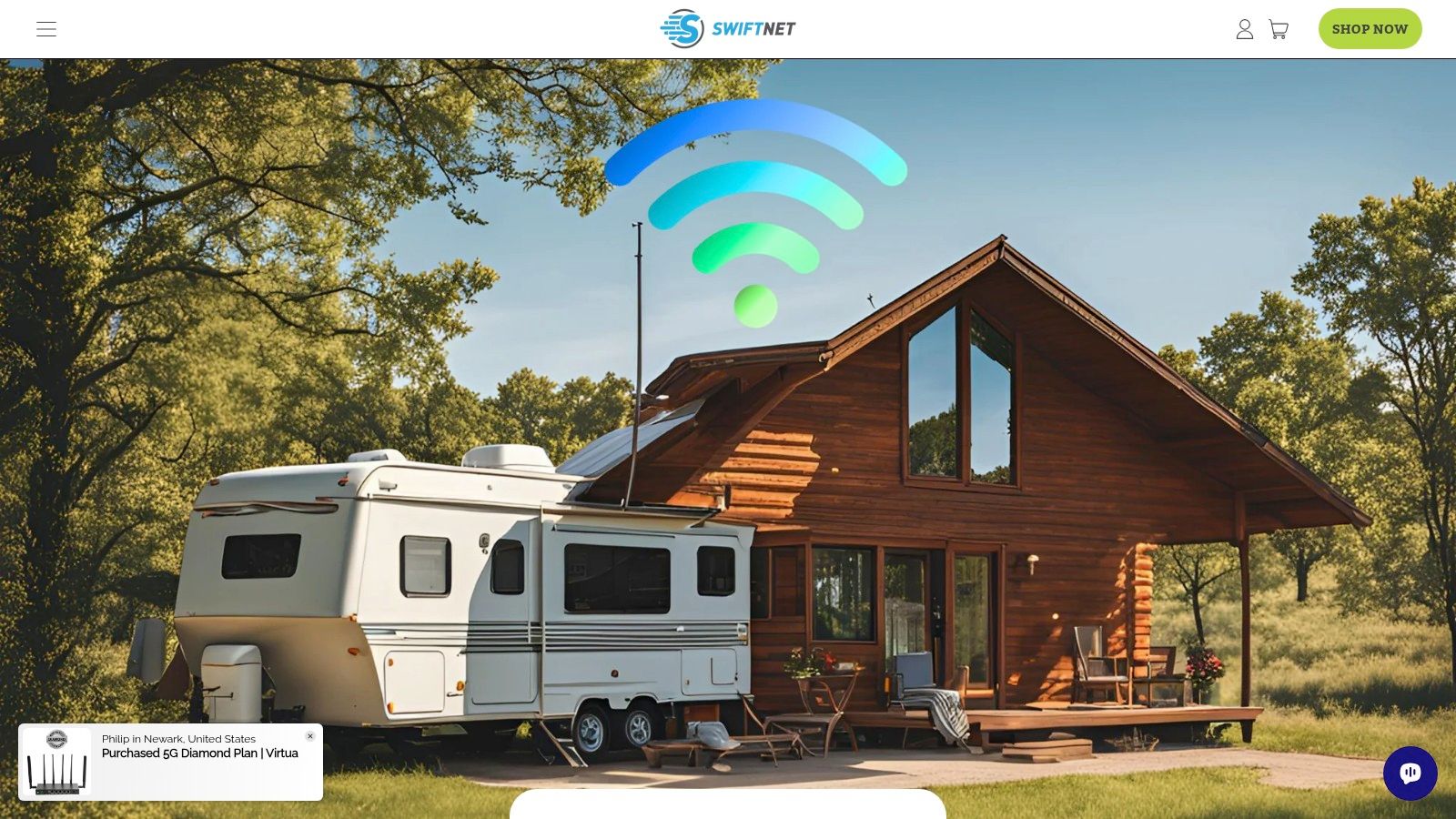
While many providers offer “mobile internet,” they often fall short in rural areas or become bogged down with high latency. SwiftNet Wifi prioritizes performance in precisely these areas, making it a valuable tool for staying connected in locations where other rv internet plans falter. Specific advantages over competitors who may use throttling or deprioritize mobile connections include a focus on consistent speeds and dedicated customer support for the unique challenges of mobile internet users. You can learn more about SwiftNet Wifi and their commitment to these underserved markets on their website.
Unfortunately, concrete details like pricing and specific technical requirements (e.g., equipment needed, data limits) are not readily available on the SwiftNet Wifi website at the time of writing. To get a personalized quote and understand what equipment is needed for your specific setup and data usage, it’s recommended to contact them directly. This individualized approach is common for specialized services like this, allowing SwiftNet Wifi to tailor solutions to the diverse needs and locations of their customer base. For example, an RV traveler might require a different setup compared to someone working remotely from a rural cabin. This personalized consultation allows SwiftNet Wifi to recommend the best rv internet plans for individual needs, unlike one-size-fits-all plans from competitors.
In terms of setup, it's likely to involve a mobile router or modem that receives the 5G signal and broadcasts a Wi-Fi network within your RV or home. While the specifics depend on the hardware offered, setup is generally user-friendly, aimed at getting customers online quickly. However, it's always advisable to confirm the setup process with SwiftNet Wifi directly during your consultation.
By focusing on providing a robust connection where other solutions struggle, SwiftNet Wifi earns its spot on this list. Their commitment to serving rural communities and RV travelers makes them a promising option for those seeking freedom and connectivity on the road or in remote locations.
2. Starlink RV
For RV enthusiasts seeking consistent, high-speed internet access no matter where their adventures take them, Starlink RV (now Starlink Roam) stands out as a leading contender among rv internet plans. This satellite internet service, powered by SpaceX, bypasses the limitations of traditional cellular networks, delivering broadband connectivity even in the most remote corners of North America and beyond. This makes it an ideal solution for those who work online remotely, live in rural areas, or simply want reliable connectivity during their travels.
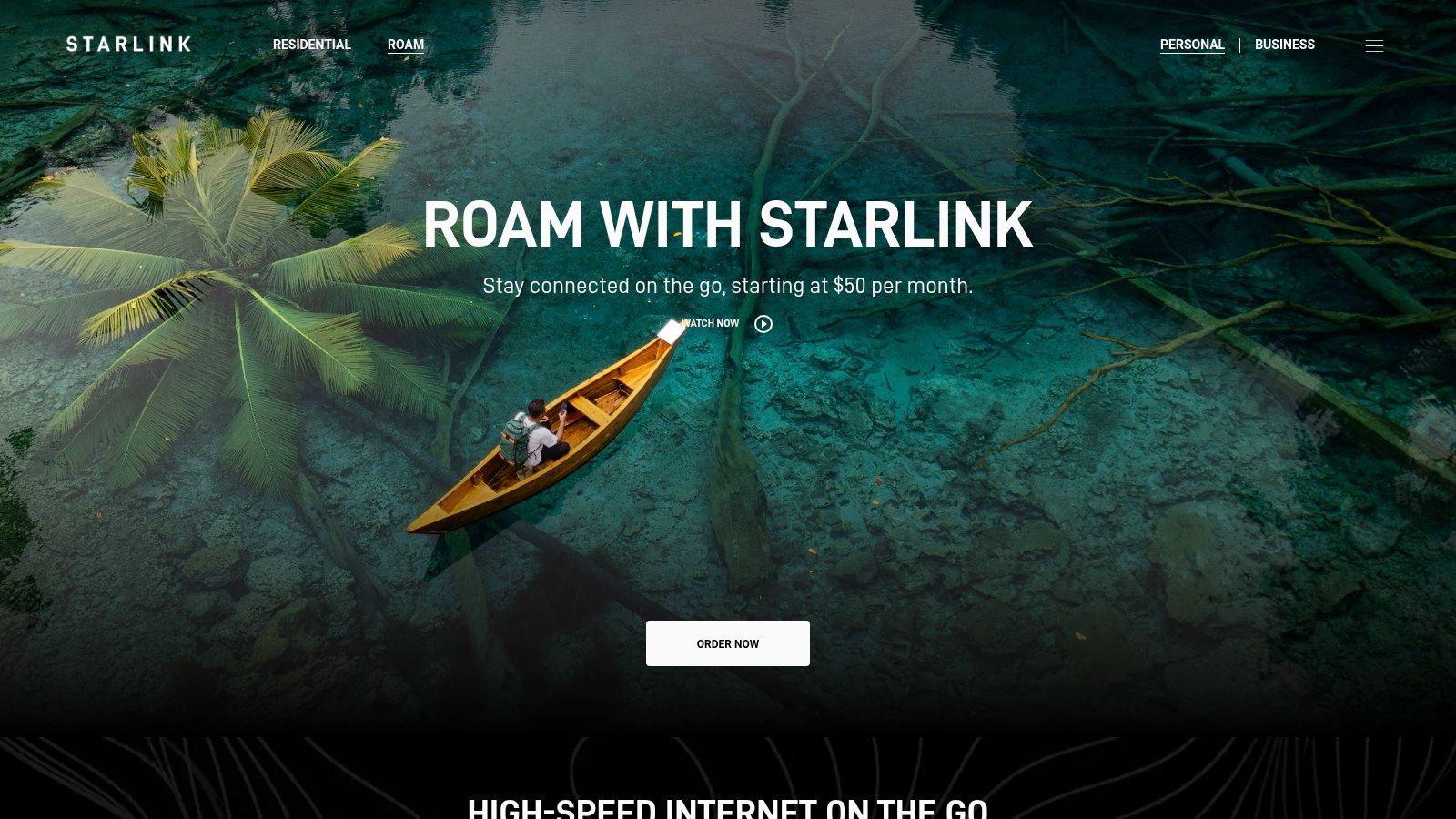
Starlink RV utilizes a portable satellite dish with an integrated router, simplifying the setup process for users with minimal technical expertise. The dish connects to Starlink's ever-growing constellation of low Earth orbit satellites, ensuring a strong and stable connection. With download speeds typically ranging from 50-200 Mbps in most locations, users can enjoy seamless streaming, video conferencing, and online gaming, regardless of their location. The service boasts no data caps with prioritized service, unlike some cellular plans that throttle speeds after a certain usage limit. The subscription model provides flexibility for seasonal travelers, allowing them to pause and unpause service as needed without being locked into contracts or long-term commitments.
The portability and performance of Starlink RV make it a powerful tool for a variety of use cases. Imagine working remotely from your RV parked beside a scenic mountain lake, or streaming your favorite shows in the desert without buffering. This kind of freedom and connectivity was previously unthinkable for many RV travelers. The absence of data caps ensures you won’t be surprised by overage charges mid-trip.
The Starlink RV kit costs $599 for the standard hardware, and the monthly service fee is $150. While this is a higher upfront cost than some alternative rv internet plans, the performance and reach justify the expense for many users, especially those who prioritize consistent connectivity and remote access. While some competitors may offer seemingly lower prices, they often come with limitations in data, speed, and availability, especially in remote locations.
Setting up Starlink RV is designed to be user-friendly. The dish requires a clear view of the sky with minimal obstructions for optimal performance. Power consumption is a factor to consider, especially for those boondocking without a robust power setup. The dish draws a significant amount of power, so adequate battery capacity or solar power is necessary for extended off-grid use.
Key Features & Benefits:
- High-Speed Internet in Remote Locations: Enjoy consistent download speeds of 50-200 Mbps, even in areas where cellular service is unavailable.
- Portability and Flexibility: The portable satellite dish and ability to pause/unpause service cater perfectly to the RV lifestyle.
- No Data Caps: Stream, download, and work online without worrying about usage limits.
- Easy Setup: Get connected quickly with minimal technical knowledge required.
- In-Motion Use: With optional in-motion hardware, stay connected even while driving.
Pros:
- Works in remote areas beyond cellular range.
- Consistent high-speed performance.
- Easy setup.
- In-motion connectivity available.
Cons:
- Higher upfront hardware cost.
- Monthly service fee is higher than some alternatives.
- Requires a clear view of the sky.
- Power consumption can be challenging for boondocking.
Website: https://www.starlink.com/roam
3. Nomad Internet
Nomad Internet is a popular choice among RVers seeking reliable internet access on the road, especially in rural locations where traditional RV internet plans fall short. Unlike fixed home internet services, Nomad Internet specializes in providing mobile connectivity by aggregating various cellular networks (including T-Mobile, AT&T, and Verizon). This allows users to tap into the strongest available signal in their area, offering a significant advantage over relying on a single carrier's network, especially when traveling extensively. This focus on mobile connectivity makes it a worthy contender in the list of top RV internet plans.
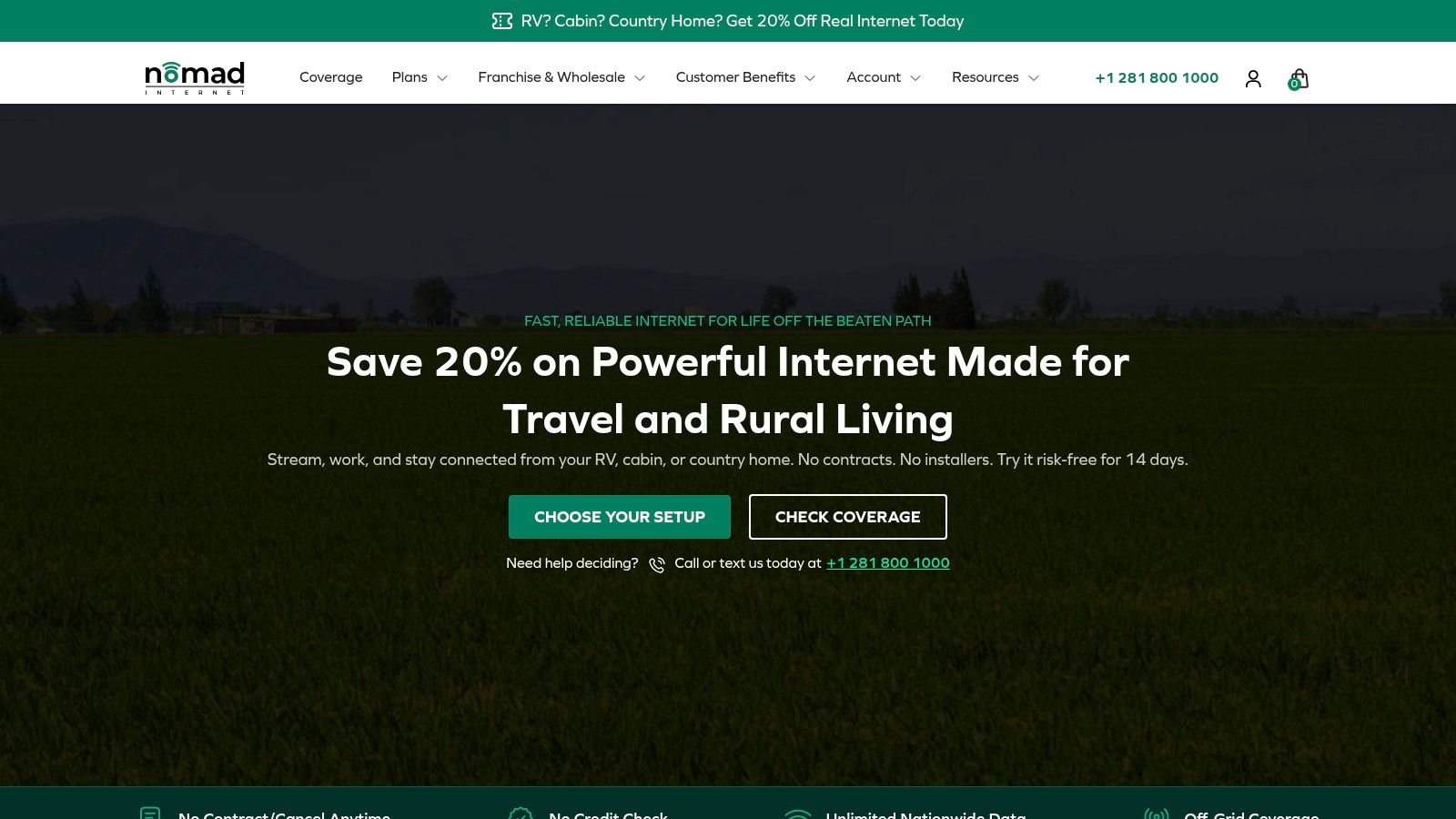
One of Nomad Internet's key selling points is its "truly unlimited" data plans. While many providers advertise unlimited data, they often throttle speeds after a certain usage threshold. Nomad Internet aims to provide consistent connectivity without these hard caps, making it suitable for data-intensive tasks like streaming, video conferencing, and online gaming while on the go. They offer a variety of plans based on different carrier networks, enabling you to select the best option based on your typical travel routes. For more detailed information, learn more about Nomad Internet.
Nomad Internet offers portable LTE and 5G router options, making it easy to set up and use in your RV. The equipment comes pre-configured, minimizing technical hurdles for users. Furthermore, the service operates on a month-to-month basis, providing flexibility without locking you into long-term contracts. This is particularly beneficial for RVers who may only need internet access during certain parts of the year. The ability to switch between carrier networks if needed further enhances its appeal for travelers.
However, this flexibility and coverage comes at a cost. Nomad Internet's plans tend to be more expensive than purchasing a plan directly from a cellular carrier, starting at $149+ per month. While the "unlimited" data is a significant draw, users may still experience prioritization during periods of network congestion, potentially leading to slower speeds. The initial cost of the router also adds to the overall expense. Finally, it's important to remember that even with multiple carrier options, coverage is ultimately dependent on cellular network availability, and there may still be areas where connectivity is limited. This is a common challenge with all cellular-based RV internet plans.
4. Verizon Mobile Hotspot Plans
Verizon Mobile Hotspot Plans are a popular choice for RV internet plans due to their expansive coverage, particularly in rural areas of the United States. This makes them a strong contender for RVers who prioritize reliable connectivity on the road. These plans offer various data allowances, catering to different usage needs, and are compatible with both dedicated hotspot devices and smartphones. With the expansion of Verizon's 5G network, users can potentially enjoy faster speeds in more locations, making streaming, working remotely, and staying connected easier than ever. This robust combination of coverage and speed is why Verizon earns a spot on this list of top RV internet options.
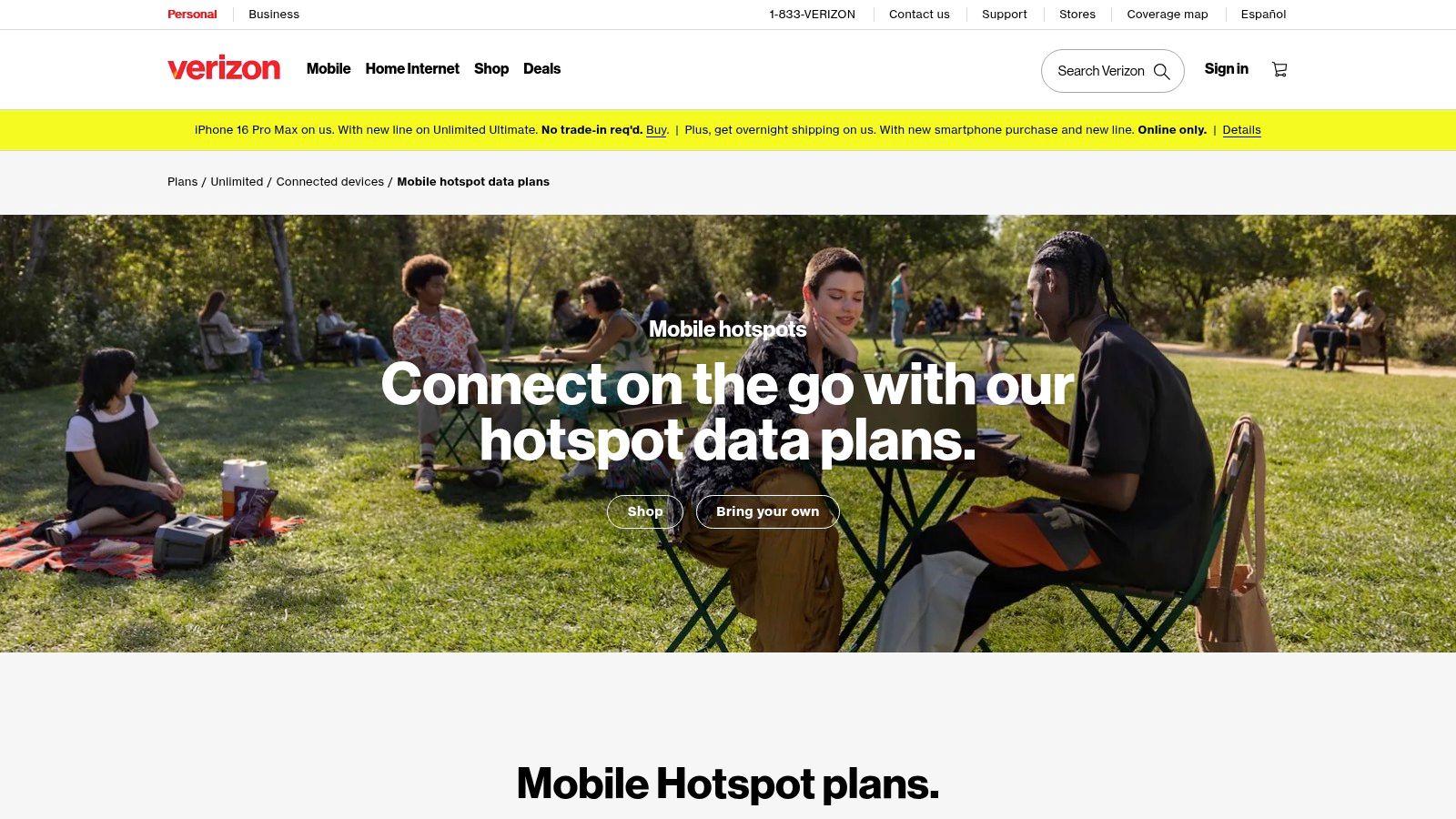
Verizon offers several mobile hotspot data plans ranging from 15GB to 150GB per month, allowing you to choose a plan that aligns with your data consumption. Pricing typically ranges from $80 to $150+ per month, depending on the data allowance. They also offer the flexibility to add hotspot data to existing Verizon accounts, which can be convenient for current Verizon customers. For those prioritizing high performance, premium network priority is available on higher-tier plans, potentially minimizing slowdowns during peak usage times. If you're interested in exploring their offerings further, you can learn more about Verizon Mobile Hotspot Plans.
For RVers working remotely, Verizon's extensive coverage can be a lifesaver, ensuring you can maintain a stable connection even when traveling off the beaten path. Those living in rural areas without access to fiber optic internet will also find Verizon’s coverage beneficial. The ability to access Verizon's 5G Ultra Wideband network, where available, provides a significant speed boost for activities like video conferencing and large file transfers. The availability of dedicated hotspot devices provides a convenient, portable solution for connecting multiple devices in your RV. Having physical stores across the country offers a support advantage should you require in-person assistance.
However, Verizon's plans come with some drawbacks. They are generally more expensive than other cellular carriers. Data speeds are throttled after exceeding your plan's data limit. While some competitors offer truly unlimited data plans, Verizon’s options in this category are limited. Finally, you might experience network congestion in popular tourist destinations. While Verizon's network reliability is generally high, these factors are essential considerations for RVers, especially those on a budget or who require substantial data usage. Many providers, while less expensive, often rely on the same towers as Verizon, potentially offering a less reliable and consistent experience, especially in remote locations.
Implementation is relatively straightforward. You can purchase a dedicated hotspot device or use your smartphone as a hotspot. Simply select a plan, activate your device, and connect your devices to the hotspot's Wi-Fi network. While other mobile providers offer seemingly similar services, Verizon's robust and widespread network, especially in rural areas, frequently distinguishes it as a top choice for consistent connectivity for RV internet plans. For remote workers and travelers in particular, this reliability can be invaluable.
5. T-Mobile Home Internet for RVs
Finding reliable internet access on the road is crucial for many RV travelers. If you're looking for RV internet plans, T-Mobile Home Internet presents a compelling, albeit unconventional, option. While not officially designed for mobile use, its attractive price point and unlimited data have made it a popular choice among RVers willing to navigate a few caveats. This solution deserves a spot on this list because it offers the most affordable unlimited data option currently available, making it particularly appealing for budget-conscious travelers.
T-Mobile Home Internet operates through a 5G/LTE gateway device that also functions as a Wi-Fi router. The service boasts unlimited data with no hard caps for a flat rate of $50/month. There are no contracts, commitments, or additional equipment fees, simplifying the budgeting process for those on the go. This simple flat-rate pricing structure is a significant advantage for RVers, offering predictable monthly costs compared to some RV internet plans with tiered data limits and overage charges.
For RVers who rely heavily on internet connectivity for work, entertainment, or staying connected with loved ones, the unlimited data is a major draw. Imagine streaming movies, participating in video conferences, or uploading large files without worrying about hitting a data cap or experiencing throttled speeds. T-Mobile's growing 5G mid-band network also offers strong coverage in many areas, providing a reliable connection for those within its reach. The included equipment further sweetens the deal, eliminating the need for separate purchases of routers and modems.
Practical Applications and Use Cases:
- Working remotely from your RV: The unlimited data allows for seamless video conferencing, file sharing, and access to cloud-based applications.
- Staying entertained on the road: Stream movies, music, and TV shows without worrying about data limits.
- Connecting with family and friends: Easily video chat and share your travel experiences.
- Managing smart RV systems: Control and monitor your RV's systems remotely with a stable internet connection.
Setup and Implementation:
Getting started with T-Mobile Home Internet is straightforward. You order the gateway device online or from a T-Mobile store, and it's shipped directly to you. Setup involves plugging in the device and connecting to the Wi-Fi network. However, the key consideration for RVers is the service's address requirement. While officially intended for fixed locations, many RVers successfully use the service while traveling by updating their registered address as needed. This may involve contacting T-Mobile or using the app to adjust the service location.
Pros:
- Most affordable unlimited option at $50/month.
- No data caps or throttling based on usage amount.
- Strong 5G mid-band coverage in many areas.
- Equipment included with monthly service.
Cons:
- Not officially supported for RV use (though many use it this way). This means relying on community forums and anecdotal experience for troubleshooting.
- Coverage can be spotty in rural areas compared to Verizon. If consistent connectivity in remote locations is paramount, exploring other RV internet plans, especially satellite-based options, may be necessary.
- May require address updates when traveling long distances. This lack of official mobility support contrasts with providers explicitly catering to the RV community.
- Lower priority on the network during congestion.
Website: https://www.t-mobile.com/home-internet
While T-Mobile Home Internet isn't a perfect solution for every RVer, its affordability and unlimited data make it a compelling option for those prioritizing value and high data usage. Its limitations regarding official mobility support highlight the importance of researching various RV internet plans to find the best fit for individual needs and travel styles. While some providers might offer similar data allowances, they often come at a higher price point, making T-Mobile's offering uniquely attractive for budget-conscious travelers.
6. AT&T RV Internet Plans
For RVers seeking a balance of coverage, performance, and price, AT&T's mobile internet plans present a compelling option for staying connected on the road. While AT&T doesn't market specific "RV internet plans," their standard mobile hotspot and data plans can effectively function as such, offering enough flexibility and data for many digital nomads and RV travelers. This makes them a worthy contender on our list of top RV internet plans.
AT&T's network shines with its strong coverage across the United States, especially along major highways and in urban and suburban areas. This makes it a great choice for RVers who frequent popular destinations or stick to well-traveled routes. Their 5G network, available with compatible devices and in covered areas, can provide blazing-fast speeds, making streaming, video conferencing, and other data-intensive tasks a breeze.
Features and Benefits:
- Variety of Data Plans: AT&T provides a range of data plans, from smaller options around 15GB per month to larger plans offering 100GB or more. This allows you to select a plan that aligns with your data consumption needs and budget.
- Hotspot Devices: You can opt for a dedicated mobile hotspot device from AT&T, ensuring a reliable and consistent Wi-Fi signal within your RV for multiple devices.
- Prepaid and Postpaid Options: Choose the flexibility of prepaid plans with no contracts, ideal for shorter trips or seasonal RVing. Alternatively, postpaid plans provide consistent billing and may offer additional features.
- Strong Urban and Highway Coverage: AT&T's network excels in providing reliable coverage in populated areas and along major travel corridors, reducing the chances of connection dropouts during your travels.
Pros:
- Balance of Value and Performance: AT&T often hits a sweet spot between cost and performance, offering competitive pricing and generally good speeds. They are often more affordable than Verizon, with similar performance in many areas.
- Flexible Plan Options: The availability of both prepaid and postpaid plans caters to various travel styles and budgets. Prepaid plans are particularly attractive for those wanting no long-term commitments.
- Business Plans for Higher Data: For those who need substantial data allowances, AT&T's business plans can provide a solution with higher data caps.
Cons:
- Limited Rural Coverage: While AT&T boasts decent coverage, it may fall short in more remote or rural areas compared to providers like Verizon. This is an essential consideration for RVers who enjoy venturing off the beaten path.
- Data Deprioritization: After exceeding your monthly data allowance, your speeds may be reduced, impacting performance for bandwidth-heavy activities.
- Limited Truly Unlimited Data: While some higher-tier plans offer substantial data, true unlimited data options without throttling are limited.
- Customer Service Concerns: While individual experiences vary, AT&T's customer service has been known for inconsistencies.
Implementation Tips:
- Check Coverage Maps: Before committing to a plan, carefully examine AT&T's coverage map for your anticipated travel routes. Verify that you'll have adequate signal strength in your destinations.
- Consider a Signal Booster: If you plan to travel in areas with fringe coverage, investing in a cell signal booster can significantly enhance your connection reliability and speeds.
- Monitor Data Usage: Keep a close eye on your data consumption to avoid exceeding your allowance and experiencing slowdowns. AT&T provides tools for monitoring data usage online.
Website: https://www.att.com/internet/data-plans/
AT&T offers a viable path to staying connected while RVing, especially if your travels primarily focus on populated areas and established routes. By carefully evaluating your data needs, considering potential coverage limitations, and selecting the right plan, you can leverage AT&T's network to power your online activities on the road. Remember to always compare options and consider alternatives like SwiftNet if reliable rural connectivity is a top priority. While AT&T shines in urban areas, SwiftNet focuses on providing robust connectivity specifically for RVers, including in those harder-to-reach locations where other providers often falter.
7. Unlimited LTE Advanced
Unlimited LTE Advanced (formerly FMCA Tech Connect+) offers a compelling solution for RVers seeking reliable internet access on the road. This membership-based service leverages T-Mobile's 4G/5G network to deliver truly unlimited data, making it a strong contender among available rv internet plans. This plan is particularly attractive for those prioritizing consistent connectivity without worrying about data caps or throttling, crucial for activities like streaming, video conferencing, and online work while traveling.
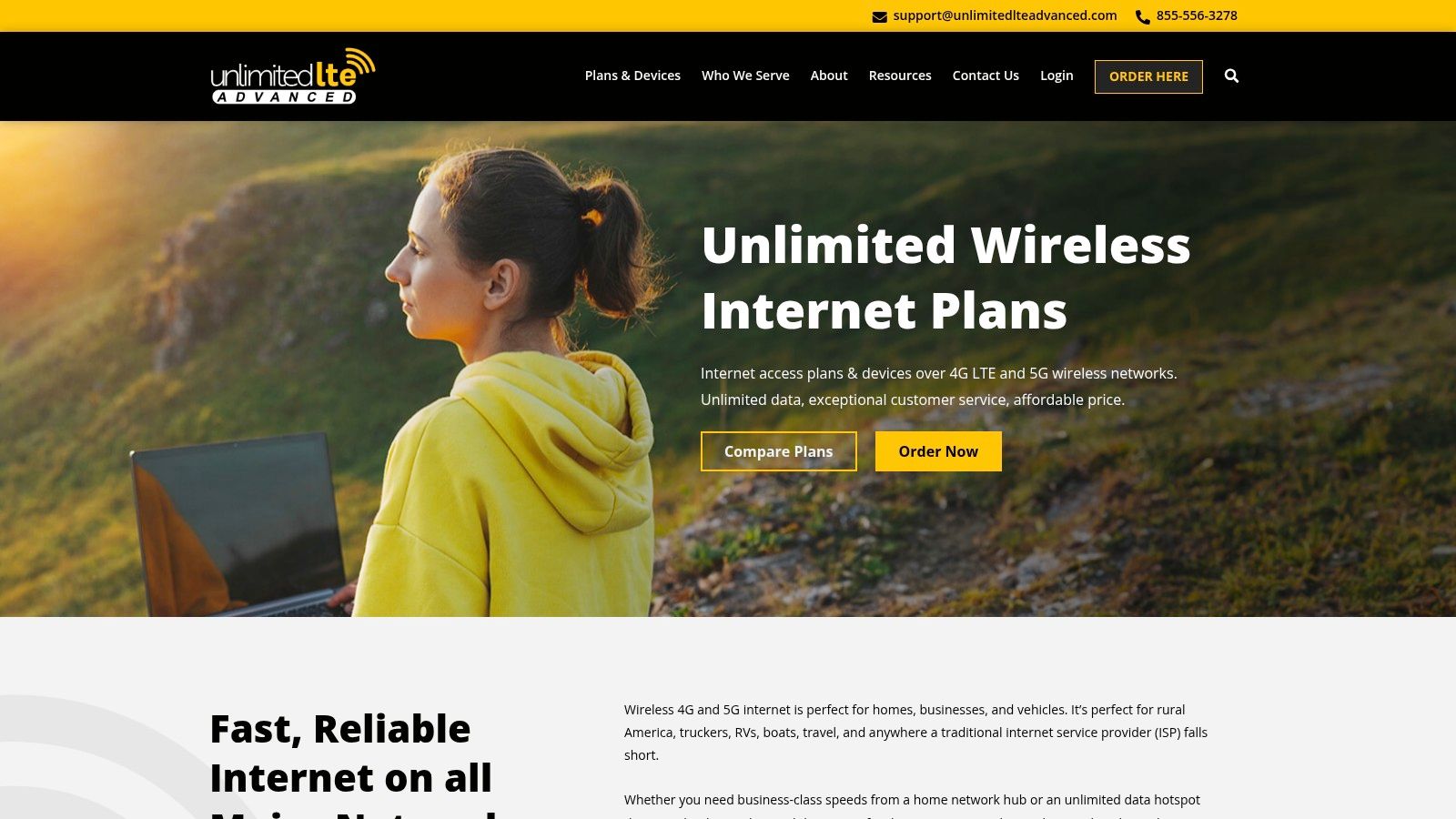
Designed specifically for the RV lifestyle, Unlimited LTE Advanced understands the unique needs of mobile internet users. The included mobile hotspot device ensures convenient connectivity wherever you park. The plan's "unlimited" promise means no throttling or speed caps, regardless of your data usage. This contrasts sharply with some competitors who advertise "unlimited" plans but then throttle speeds after a certain threshold, making activities like streaming video difficult. This commitment to truly unlimited data solidifies Unlimited LTE Advanced's position as a valuable tool for staying connected on the road. The predictable monthly cost of $59.99, plus membership fees, simplifies budgeting, and the month-to-month contract offers flexibility not always found with other rv internet plans.
For those considering various rv internet plans, Unlimited LTE Advanced stands out for its RV-centric approach. The community support available through associated RV organizations like FMCA provides a valuable resource for troubleshooting and sharing tips. This community aspect can be particularly beneficial for newcomers to the world of mobile internet.
Implementation and Setup: Setting up Unlimited LTE Advanced is straightforward. Upon subscribing and receiving your mobile hotspot device, simply power it on and follow the included instructions to connect your devices. Because it operates on T-Mobile's network, activation is typically quick and easy.
Features and Benefits:
- Truly unlimited data: Enjoy unrestricted internet access without data caps.
- No throttling: Maintain consistent speeds even with high data usage.
- Mobile hotspot device included: Convenient portability for connectivity anywhere within T-Mobile's coverage area.
- RV-focused design: Caters specifically to the needs of RV travelers.
- Community support: Access helpful resources and support through RV associations.
Pros:
- Affordable unlimited data ($59.99/month plus membership fees)
- No contracts, offering month-to-month flexibility.
- Optimized for RV travel patterns.
- Community support through RV associations.
Cons:
- Requires membership in FMCA or a partner organization.
- Limited to T-Mobile network coverage. While many areas are covered, it's essential to check coverage maps before relying on this service as your primary internet source.
- Potential for prioritization during network congestion. While the unlimited data is a significant advantage, during times of heavy network traffic, you might experience slower speeds compared to prioritized users.
- As a reseller service leveraging T-Mobile's network, long-term availability could be less predictable than a direct-from-carrier plan.
Website: https://www.unlimitedlteadvanced.com/
In summary, Unlimited LTE Advanced earns its spot on this list of rv internet plans by providing a simple, affordable, and genuinely unlimited data solution tailored to the RV community. While the reliance on T-Mobile's network and the membership requirement are factors to consider, the benefits of unlimited data, no throttling, and a dedicated mobile hotspot make it a valuable option for staying connected on the road.
7-Point RV Internet Plans Comparison
| Service | Key Features ✨ | User Experience ★ | Value Proposition 💰 | Target Audience 👥 |
|---|---|---|---|---|
| 🏆 SwiftNet Wifi | 5G broadband; Rural & RV optimized | Dependable connectivity | Competitive pricing | Rural residents & RV travelers |
| Starlink RV | Portable satellite dish; High-speed & low latency | Consistent performance | Premium pricing; flexible pause option | RV travelers in remote areas |
| Nomad Internet | Carrier aggregation; Truly unlimited data | User-friendly; flexible setup | Higher monthly cost | RVers needing wide network coverage |
| Verizon Mobile Hotspot Plans | Nationwide 5G; Multiple data plan options | Reliable & robust | Premium pricing for extensive coverage | Travelers needing extensive reach |
| T-Mobile Home Internet for RVs | Unlimited data; 5G/LTE gateway | Affordable; simple setup | Flat-rate at $50/month | Budget RVers & occasional travelers |
| AT&T RV Internet Plans | Flexible data options; Dedicated hotspot devices | Balanced performance | Cost-effective with varied plans | Urban/suburban RV users |
| Unlimited LTE Advanced | RV-specific; Unlimited data; Mobile hotspot device | Optimized for mobile lifestyles | Affordable at $59.99/month plus membership | FMCA members & dedicated RV enthusiasts |
Staying Connected on the Open Road: Your Perfect RV Internet Companion
Finding reliable internet access on the road can be a challenge, but with the right RV internet plan, you can stay connected wherever your adventures take you. This article explored various options for RV internet plans, ranging from mobile hotspots and satellite internet to dedicated RV internet services. We covered key players like Starlink RV, Nomad Internet, traditional cellular plans from Verizon, T-Mobile, and AT&T, and even options like Unlimited LTE Advanced. Each plan caters to different needs and budgets, so understanding their strengths and weaknesses is essential. For example, while Starlink RV offers impressive speeds and coverage, it comes with a higher price tag and equipment costs. Similarly, while traditional mobile hotspots can be convenient, they often suffer from data caps and throttling, making them less suitable for consistent, high-bandwidth usage.
Key takeaways when choosing an RV internet plan include prioritizing your data usage, considering your travel style (do you frequent remote areas or stick to established campgrounds?), and factoring in your budget. While several options exist, remember that factors like customer service, ease of setup, and reliability specifically designed for RV living are often overlooked. Some companies may offer attractive initial prices but lack the specialized support that RVers require.
For a truly seamless and reliable internet experience tailored to the needs of RV travelers, SwiftNet Wifi emerges as a strong contender. While other providers may offer similar services, SwiftNet Wifi focuses specifically on providing reliable connections for those living the RV lifestyle, often providing better support and understanding of the unique challenges RVers face. We encourage you to compare SwiftNet Wifi with other options discussed in this article, paying close attention to customer reviews and features specifically geared toward RV use. You’ll likely find that SwiftNet Wifi provides a superior experience tailored to the nomadic lifestyle.
Ready to hit the road with confidence and stay connected wherever your travels take you? Explore SwiftNet Wifi's range of RV internet plans designed to keep you online from coast to coast. Visit SwiftNet Wifi today and discover the perfect connectivity solution for your RV adventures.


















































